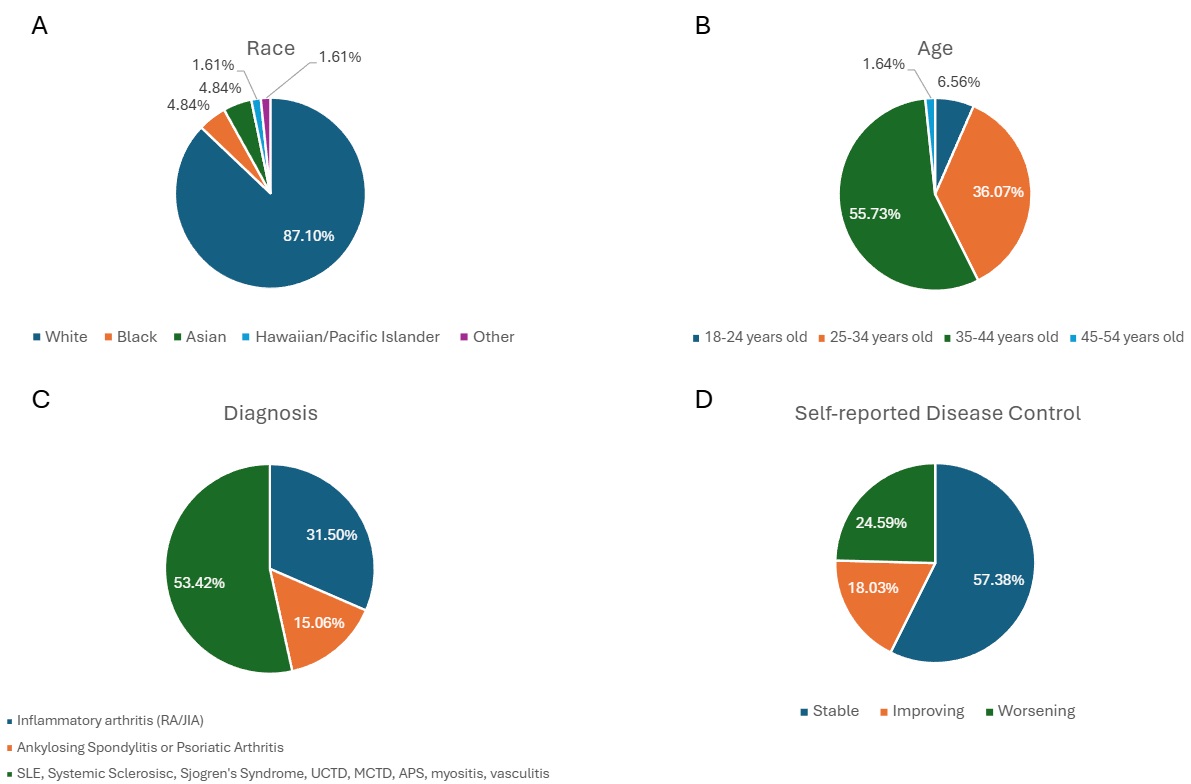Session Information
Date: Tuesday, October 28, 2025
Title: (2195–2226) Reproductive Issues in Rheumatic Disorders Posters
Session Type: Poster Session C
Session Time: 10:30AM-12:30PM
Background/Purpose: Building on our 2024 ACR study (Topalsky et al.) that described broad knowledge gaps and interest in reproductive health education among women with rheumatic diseases, we designed a follow-up study to assess whether these needs vary across clinical and demographic subgroups. This study aimed to explore whether disease type, time since diagnosis, or age significantly influence sexual and reproductive health (SRH) concerns amongst our patients.
Methods: In this follow-up study, a revised survey was sent to our female patients aged 18-45 years with autoimmune rheumatic diseases seen in the Rheumatology Department at our institution. We developed a mixed-format questionnaire expanding on the 2024 survey to further assess demographic, clinical, and attitudinal data. Subjects were identified using Slicer Dicer, a data exploration tool in the EPIC EMR that allows for customized searches on large patient populations. Surveys were sent and patient responses collected through REDCap, a secure web application for building and managing online surveys and databases. We conducted chi-square analyses comparing outcomes across subgroups (disease type, time since diagnosis, age group) to identify any differential needs. The study received IRB approval at our institution.
Results: 200 patients received an online survey, of which 61 replied, yielding a 30.5% response rate. Respondents were predominantly middle-aged white patients with a range of rheumatologic diagnoses, most of whom felt their disease was stable (Figure 1). About half reported ever receiving pregnancy-related information and understanding of pregnancy risks varied, with a large portion feeling only somewhat or not informed (Figure 2). Interest in targeted reproductive-health education was high across all subgroups, particularly around fertility and conception as well as managing parenthood with a chronic illness (Figure 3).Subgroup analyses revealed no significant differences by disease type, diagnosis duration, or age in disease control, contraception use, pregnancy concerns, information receipt, risk understanding, or interest in educational sessions (all p > 0.05), suggesting that reproductive‐health needs are uniformly shared across all patient subgroups.
Conclusion: While our 2024 abstract described widespread informational gaps and a strong preference for online education, this follow-up with novel subgroup analysis reveals that these gaps and needs are uniformly experienced across all patient groups. This supports the development of universally accessible reproductive health education for rheumatology patients. These insights go beyond earlier descriptive findings and directly inform the design of inclusive educational interventions.
 Figure 1. Demographic and Clinical Characteristics of Respondents
Figure 1. Demographic and Clinical Characteristics of Respondents
.jpg) Figure 2. Unmet Educational Needs: Information Sources and Risk Understanding
Figure 2. Unmet Educational Needs: Information Sources and Risk Understanding
.jpg) Figure 3. Interest in Reproductive Health Education Topics
Figure 3. Interest in Reproductive Health Education Topics
To cite this abstract in AMA style:
Topalsky K, Guan C, Frumker L, Nachawati D, Tiwana A, Gump M, Pamuk O, Magrey M. Expanding Reproductive Health Assessments in Rheumatic Diseases: A Comparative Analysis of Demographic and Disease-Specific Factors [abstract]. Arthritis Rheumatol. 2025; 77 (suppl 9). https://acrabstracts.org/abstract/expanding-reproductive-health-assessments-in-rheumatic-diseases-a-comparative-analysis-of-demographic-and-disease-specific-factors/. Accessed .« Back to ACR Convergence 2025
ACR Meeting Abstracts - https://acrabstracts.org/abstract/expanding-reproductive-health-assessments-in-rheumatic-diseases-a-comparative-analysis-of-demographic-and-disease-specific-factors/
